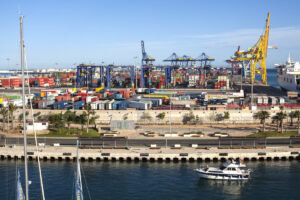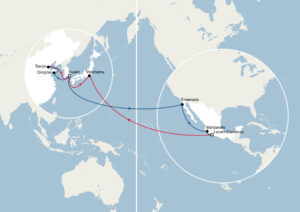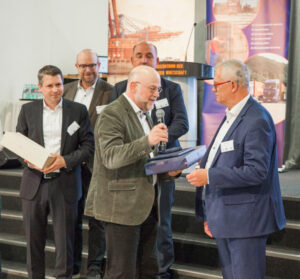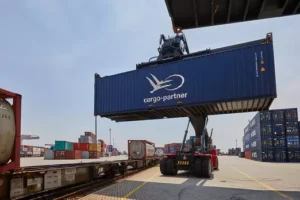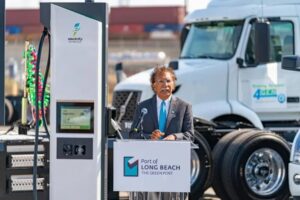The Port of Barcelona, APM Terminals Barcelona, HAM and Naturgy successfully conclude a pilot to test the viability of natural gas as a fuel in port equipment.
In a project co-financed by the European Union, the Port of Barcelona, APM Terminals Barcelona, HAM and Naturgy recently concluded a pilot which tested the viability of using natural gas as a fuel in port equipment.
For the project, an APM Terminals Barcelona straddle carrier was converted to natural gas. The results were positive, with a certified reductions in greenhouse gas emissions, specifically CO and CO2, compared to diesel-powered machines.
On the test bench, fuel consumption was reduced by 11%, which could provide an economic boost for the transformation or purchase of new gas-powered machines.
Total hydrocarbon emissions were also reduced through the use of natural gas, according to tests carried out with APM Terminals Barcelona’s straddle carrier. To achieve a reduction in nitrogen oxides, the tests concluded that the installation of catalytic converters was required.
The project to upgrade the straddle carrier to natural gas began in January 2016.
With a budget of €1.22 million, the project is part of the Core LNGas hive scheme, coordinated by Enagás. Some 42 partners are participating in 14 studies and 11 pilot projects.
The Core LNGas hive project has an overall budget of €33.3 million and is 50% co-financed by the European Union’s CEF programme.
For the straddle carrier adaptation project, Idiada, a leading Catalan multinational in the sector of engineering and homologation for the automotive sector, was responsible for modifying the diesel engine for use with natural gas.
This involved machining the cylinder head and cylinders, installing gas injectors and changing electronics and engine sensors.
Tests, carried out on Idiada Powertrain’s test bench and at APM Terminals Barcelona’s facilities, verified that engines converted to 100% natural gas could provide the required performance while producing lower emissions. Idiada carried out emissions measurement tests using a Portable Emissions Measurement System.
APM Terminals Barcelona was in charge of the assembly and commissioning of the converted straddle carrier.
The main challenge for the pilot was to ensure that it didn’t disturb ongoing operations at the terminal and did not increase safety risks for port workers.
The terminal carried out a number of risk studies to determine the feasibility of using natural gas and the implementation of safety measures, such as maintaining a distance of 25m during LNG refuelling. The machine was able operate within the terminal’s normal operations, with similar autonomy to diesel.
HAM, a company headquartered in Abrera (Barcelona) with a network of gas stations and liquefied natural gas (LNG) transport facilities in Europe, installed a 600-litre LNG tank and a piping system to feed the converted engine. It also enabled LNG refuelling using a new mobile refuelling station, developed to operate in different locations in accordance with all safety measures.
Naturgy carried out an LNG supply logistics study, both from a technical and economic point of view. Studying the different supply alternatives for terminal equipment was a critical part of the project, as such equipment cannot simply drive to the nearest gas station. The most viable option was the use of a mobile station developed by HAM.
The Port of Barcelona coordinated the project, both technically and financially, and carried out the safety studies. Reducing pollutant emissions and greenhouse gases by 100% by 2050, is one of the Port of Barcelona’s priorities and in line with the objectives of the European Union and the International Maritime Organization.


